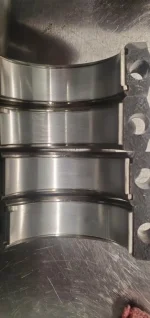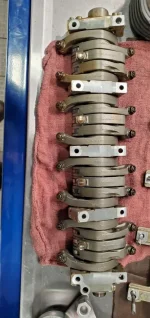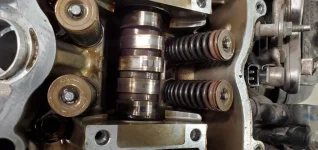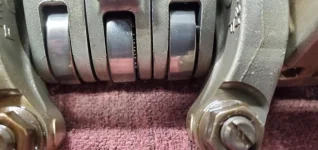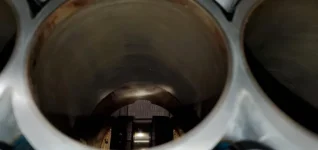So here's some background. I've got a Hemi with a low oil pressure situation, and I want to protect it as best as possible - but I have to drive it a few times before it gets fixed. Kind of a rock vs hard place.
The pressure is only a problem until the engine has warmed up, specifically when the oil temp reaches 185 degrees, after which I immediately gain about 20psi at 600 rpm. Weird, yes Startup is pretty noisy for a few moments, but it's not gotten worse, and sounds like it's only in the upper end. If I manually keep the engine at around 1.5k it seems to be ok while it warms up.
Startup is pretty noisy for a few moments, but it's not gotten worse, and sounds like it's only in the upper end. If I manually keep the engine at around 1.5k it seems to be ok while it warms up.
I think I have two different things going on. One (and the main problem) is likely a partially bad oil pickup o-ring, and/or maybe a crack developing in the plastic integrated pickup tube.
The other - and I know this sounds funky, but it is happening consistently - is the 20psi jump in oil pressure @ 185 degrees oil temp. I've also seen where plugging a computer running AlfaODB into the OBD2 port caused a similar pressure jump; that happened exactly once, but it did happen. I've not run across anything to indicate some kind of valve changing status that could account for this, so I'm as stumped as Macca's 2nd wife.
Back to the o-ring/pickup tube. I've changed the oil twice since starting this project, and both times the first startup after adding the oil was quiet and normal. I'm thinking that the level of oil in the pan was initially higher, because it hasn't distributed through the engine - then subsequent startups were low pressure & noisy, because the oil level was lower (because the oil filter anti-drain back valve was keeping it in the engine, as it should).
So, I want to raise the level of the oil in the sump by (say) a quart, and see if this helps matters. I'll be driving it carefully because of the possibility of foaming the oil. I have 6 quarts of 5w30 Mobil 1 EP in already, and a quart of LubeGard, for a total of 7 quarts which is nominal for a 3rd gen Hemi. This additional amount can be more M1 EP 5w30, but I also have a bottle of Ceratec here. I'm wondering if it would be not totally insane to put that in, which would be alongside the LubeGard.
Price/cost is not an issue - the Ceratec was $28, engine work is different. I just wondered if anyone had experience doing this, and can indicate a hard no, because of an incompatibility between both products?
The pressure is only a problem until the engine has warmed up, specifically when the oil temp reaches 185 degrees, after which I immediately gain about 20psi at 600 rpm. Weird, yes
I think I have two different things going on. One (and the main problem) is likely a partially bad oil pickup o-ring, and/or maybe a crack developing in the plastic integrated pickup tube.
The other - and I know this sounds funky, but it is happening consistently - is the 20psi jump in oil pressure @ 185 degrees oil temp. I've also seen where plugging a computer running AlfaODB into the OBD2 port caused a similar pressure jump; that happened exactly once, but it did happen. I've not run across anything to indicate some kind of valve changing status that could account for this, so I'm as stumped as Macca's 2nd wife.
Back to the o-ring/pickup tube. I've changed the oil twice since starting this project, and both times the first startup after adding the oil was quiet and normal. I'm thinking that the level of oil in the pan was initially higher, because it hasn't distributed through the engine - then subsequent startups were low pressure & noisy, because the oil level was lower (because the oil filter anti-drain back valve was keeping it in the engine, as it should).
So, I want to raise the level of the oil in the sump by (say) a quart, and see if this helps matters. I'll be driving it carefully because of the possibility of foaming the oil. I have 6 quarts of 5w30 Mobil 1 EP in already, and a quart of LubeGard, for a total of 7 quarts which is nominal for a 3rd gen Hemi. This additional amount can be more M1 EP 5w30, but I also have a bottle of Ceratec here. I'm wondering if it would be not totally insane to put that in, which would be alongside the LubeGard.
Price/cost is not an issue - the Ceratec was $28, engine work is different. I just wondered if anyone had experience doing this, and can indicate a hard no, because of an incompatibility between both products?

